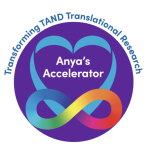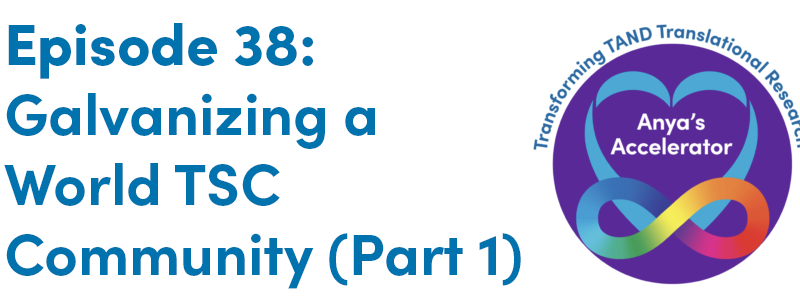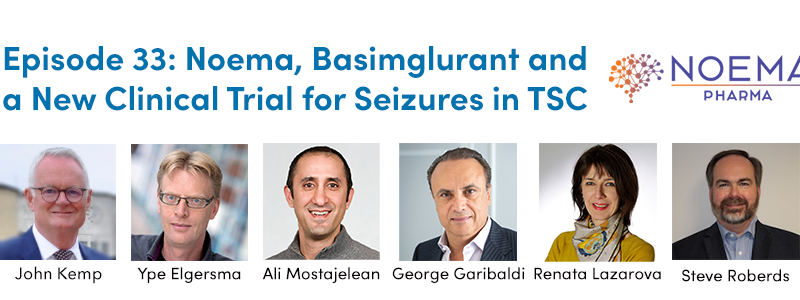Podcast: Play in new window | Download
Subscribe: Apple Podcasts | Spotify | Amazon Music | Blubrry | RSS | More
In a special two-part episode of TSC Now, host Dan Klein recaps the 2022 World TSC Conference, which was held in Dallas, Texas July 28-31, 2022. In part one Dan talks to two inspiring and visionary leaders in the tuberous sclerosis complex (TSC) community.
On Thursday, July 28, during the opening of the 2022 World TSC Conference in Dallas, the Ramesh and Kalpana Bhatia Family Foundation announced a new collaboration with the TSC Alliance, working together to uncover biomarkers, test new treatments and connect researchers with families to better address TSC-associated neuropsychiatric disorders (TAND), which impact nearly everyone living with tuberous sclerosis complex (TSC). The $2.5 million foundational gift is the largest single donation in the TSC Alliance’s history.
Dan first chats with Anita Bhatia, Executive Director of the Ramesh and Kalpana Bhatia Family Foundation, who announced the transformational investment to the TSC community at the conference (02:25). They discuss what it was like to announce the partnership in Dallas, what motivates her family’s generosity and how she hopes this investment will accelerate research on TSC-associated neuropsychiatric disorders (TAND) to develop new treatments and educate physicians and individuals affected by TSC so they can be better advocate for high quality care.
 This new funding will create “Anya’s Accelerator,” which will focus on furthering TAND translational research. TAND includes a wide range of cognitive, behavioral and psychiatric challenges linked to the disease’s effect on brain function. The three-year “Anya’s Accelerator” research program will focus on three major goals:
This new funding will create “Anya’s Accelerator,” which will focus on furthering TAND translational research. TAND includes a wide range of cognitive, behavioral and psychiatric challenges linked to the disease’s effect on brain function. The three-year “Anya’s Accelerator” research program will focus on three major goals:
- Developing quantifiable patient-reported outcomes for the most impactful aspects of TAND utilizing the combined expertise of individuals and families living with TSC and clinical researchers;
- Identifying biomarkers and predictors of specific aspects of TAND through collaborative and inclusive analysis of existing samples and data; and
- Improving the translatability of and testing candidate drugs in TAND-relevant animal models by incorporating biomarkers or predictors relevant to those identified in humans.
Next, Dan catches up with Pete Crino, MD, PhD, Chair of the TSC Alliance Board of Directors and the Clinic Director at the TSC Center of Excellence at the University of Maryland Medical Center (21:11). They talk about how conferences like the World TSC Conference are conduits for both the community to form new connections and get more involved in the organization, but also for researchers and clinicians to foster new collaborations and explore new avenues of research. Dr. Crino also shares why the TSC community is a vital partner in advancing TSC research and how with the support of the community and a dedicated corps of researchers and clinicians, and the infrastructure developed by the TSC community to support research, a cure for TSC is within reach.
If you weren’t able to join us in Dallas at the World TSC Conference, conference session recordings will be made available on our YouTube channel in early 2023.
Resources and Links
- Learn more about the $2.5 million gift from the Bhatia Family Foundation: https://www.prnewswire.com/news-releases/tsc-alliance-and-ramesh-and-kalpana-bhatia-family-foundation-announce-new-tsc-research-collaboration-301594331.html
- Learn more about the Ramesh and Kalpana Bhatia Family Foundation: http://www.rkbhatiafoundation.org/
- Learn more about TAND: https://www.tscalliance.org/about-tsc/signs-and-symptoms-of-tsc/brain-and-neurological-function/tand/
- Learn more about the TSC Center of Excellence at the University of Maryland Medical Center: https://www.umms.org/ummc/health-services/neurology/services/tuberous-sclerosis
This podcast is sponsored by:



